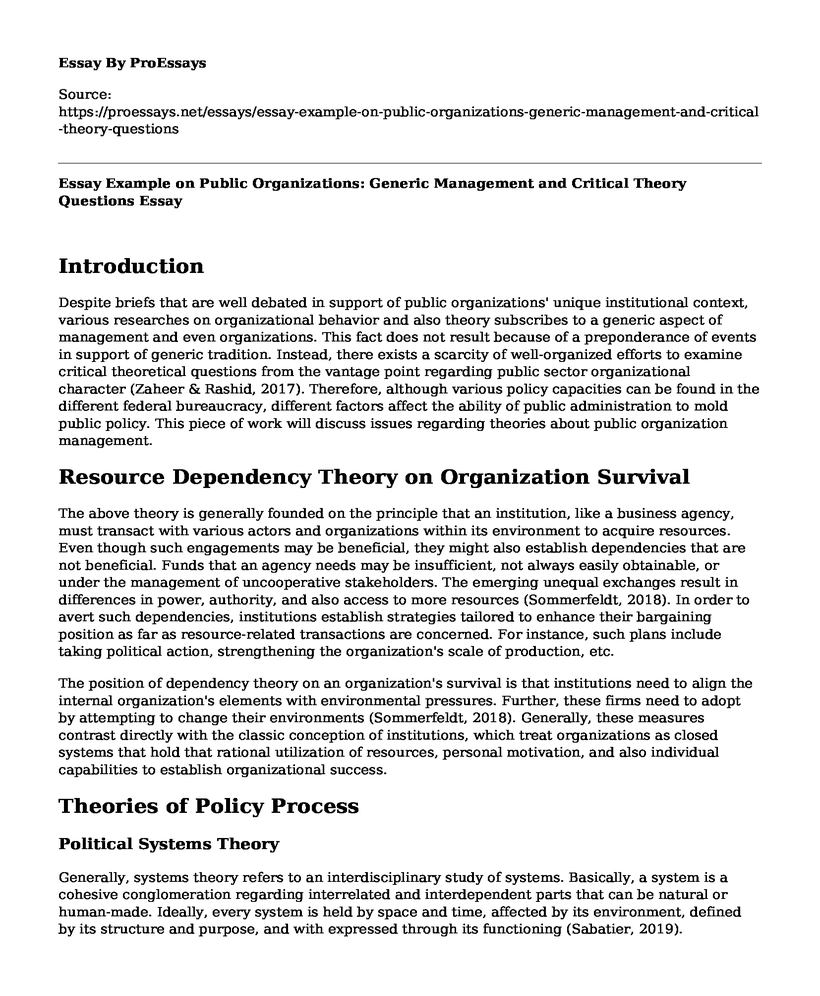Introduction
Despite briefs that are well debated in support of public organizations' unique institutional context, various researches on organizational behavior and also theory subscribes to a generic aspect of management and even organizations. This fact does not result because of a preponderance of events in support of generic tradition. Instead, there exists a scarcity of well-organized efforts to examine critical theoretical questions from the vantage point regarding public sector organizational character (Zaheer & Rashid, 2017). Therefore, although various policy capacities can be found in the different federal bureaucracy, different factors affect the ability of public administration to mold public policy. This piece of work will discuss issues regarding theories about public organization management.
Resource Dependency Theory on Organization Survival
The above theory is generally founded on the principle that an institution, like a business agency, must transact with various actors and organizations within its environment to acquire resources. Even though such engagements may be beneficial, they might also establish dependencies that are not beneficial. Funds that an agency needs may be insufficient, not always easily obtainable, or under the management of uncooperative stakeholders. The emerging unequal exchanges result in differences in power, authority, and also access to more resources (Sommerfeldt, 2018). In order to avert such dependencies, institutions establish strategies tailored to enhance their bargaining position as far as resource-related transactions are concerned. For instance, such plans include taking political action, strengthening the organization's scale of production, etc.
The position of dependency theory on an organization's survival is that institutions need to align the internal organization's elements with environmental pressures. Further, these firms need to adopt by attempting to change their environments (Sommerfeldt, 2018). Generally, these measures contrast directly with the classic conception of institutions, which treat organizations as closed systems that hold that rational utilization of resources, personal motivation, and also individual capabilities to establish organizational success.
Theories of Policy Process
Political Systems Theory
Generally, systems theory refers to an interdisciplinary study of systems. Basically, a system is a cohesive conglomeration regarding interrelated and interdependent parts that can be natural or human-made. Ideally, every system is held by space and time, affected by its environment, defined by its structure and purpose, and with expressed through its functioning (Sabatier, 2019). Consequently, in political science, a system can also be defined as the process of making or enacting government decisions, which will subsequently affect all public institutions specifically.
Institutionalism Theory
Generally, institutions are social structures that have acquired a higher degree of resilience. They usually constitute cultural-cognitive, normative, and also regulative aspects that, together with activities and resources associated with, provide strength and meaning to social life. Ideally, agencies are transmitted by different kinds of carriers, including symbolic systems, relational systems, etc. These agencies operate at various levels or jurisdictions, for example, from the world systems to localized interpersonal relations (Sabatier, 2019). Therefore, the institutional theory is an in-depth and also more resilient context of social frameworks. In that, it considers the actions by which structures, like rules, norms, and schemes and even routines, become developed as authoritative directions for social behavior. Various elements of this theory demonstrate how these components are established, diffused, adopted, and also adapted over space together with time.
In conclusion, environmental issues can be demonstrated as identifiable components in the cultural, economic, political, etc. that can affect the growth, operations, and survival of entities, particularly public organizations. In a nutshell, environmental factors may be both external as well as internal for an agency.
References
Sabatier, P. (2019). Theories of the policy process. Routledge.Sommerfeldt, E. J. (2018). Resource Dependency Theory. The International Encyclopedia of Strategic Communication, 1-5.
Zaheer, A. N., & Rashid, A. (2017). Analyzing the role of public sector marketing in improving social effectiveness: a case study from Anhui province, China. International Review on Public and Nonprofit Marketing, 14(1), 57-71.
Cite this page
Essay Example on Public Organizations: Generic Management and Critical Theory Questions. (2023, Apr 24). Retrieved from https://proessays.net/essays/essay-example-on-public-organizations-generic-management-and-critical-theory-questions
If you are the original author of this essay and no longer wish to have it published on the ProEssays website, please click below to request its removal:
- Statements About Power and Knowledge Paper Example
- Child Vaccinations: Annotated Bibliography
- The Necessary Essentials for Financial Viability in Healthcare Paper Example
- Essay Sample on Tribal Governance
- Essay on Just in Time Inventory Mgmt: Enhancing Efficiencies Through Supplier-Buyer Integration
- Government Policies on Genetic Info for Felony Prevention - Essay Sample
- Explore the World of Radioisotopes: How They Are Produced - Essay Sample







